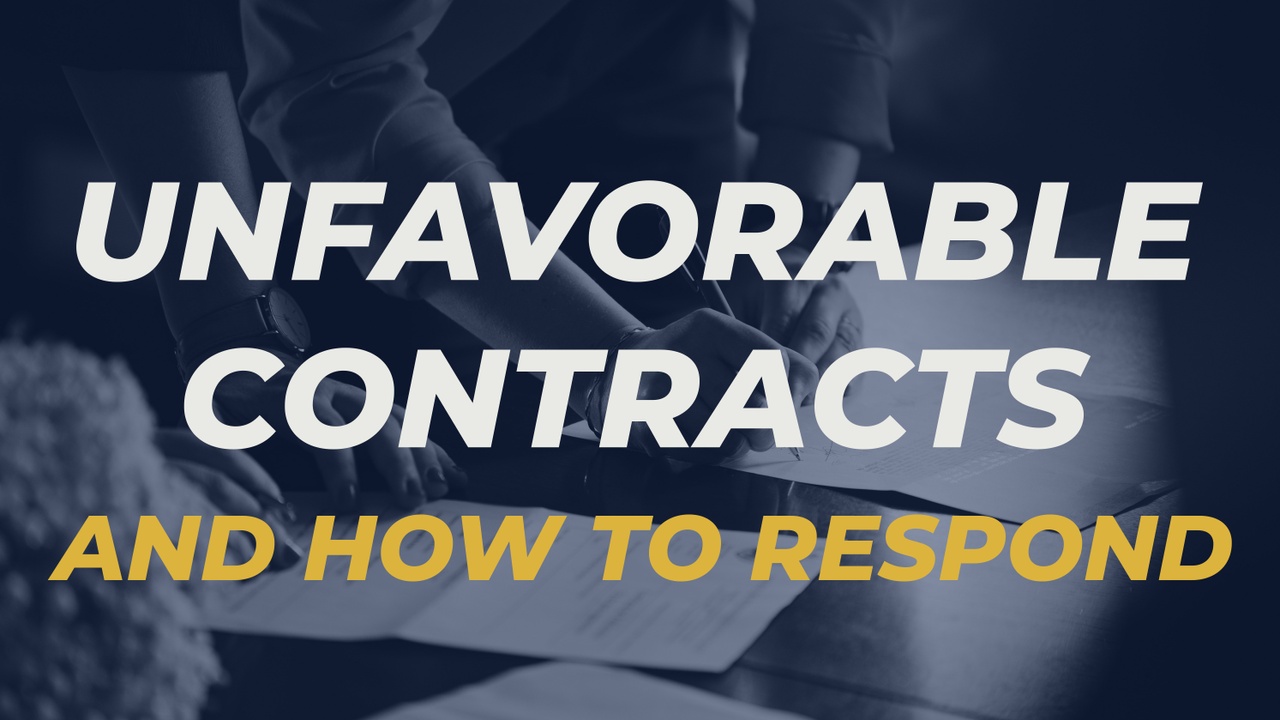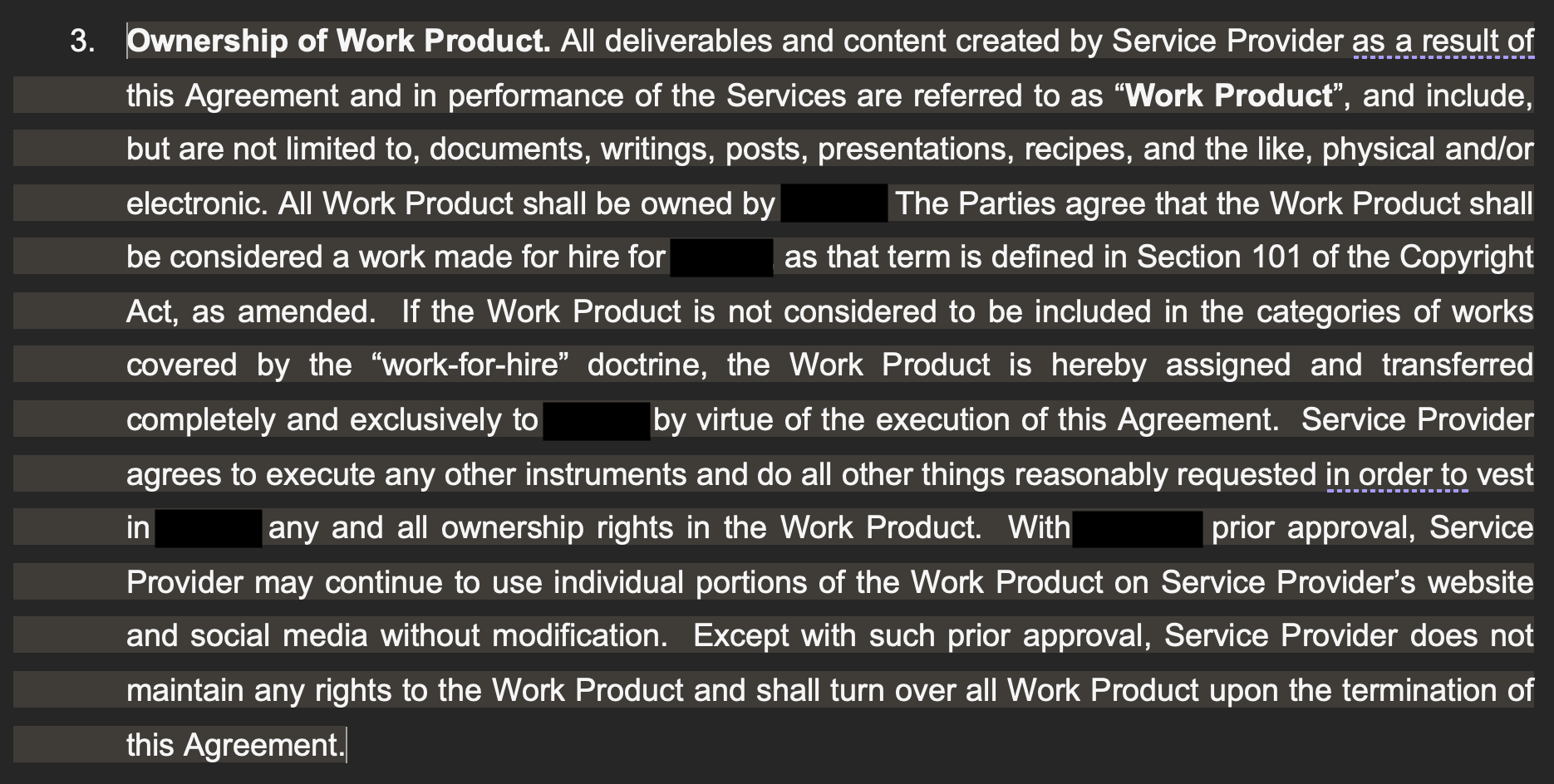
How to Edit an Unfavorable Contract
Aug 03, 2022In the early days as a photographer I would read through some of my client contracts and my stomach would just churn.
I knew what I was reading was not a good deal for me. Things like the client would own my work. They could use it for perpetuity. I would need to release any claim I had to the work, etc.
None of it sounded good. Sure I would be getting paid, but nowhere near the amount to justify such massive terms like that.
For whatever reason I signed some of those agreements early on.
And I would be mad about it... even back then. I just ended up resenting the work I did and resenting the client. Really, whatever amount of money I got paid just wasn't worth it.
Honestly, all I had to do was send back suggested edits.
It's perfectly normal and reasonable to suggest edits to your client contracts– that's why they send you the contract to review in the first place! But there's something about when you're starting out and you're just hungry for work, and you don't want to annoy your clients, so you often end up just signing whatever unfavorable terms they send over without even asking to edit the terms.
I'm telling you– 9 times out of 10– most clients are just sending a mostly boilerplate contract that they received from their legal team or contracting service. They may have not even closely read the terms themselves and are generally more than happy to edit the contract to your liking. Only once in my career has a client ever told told me that they would not edit a contract– and that's one contract out of literally hundreds that I have received.
The big one– who owns the work?
Here is an excerpt from an actual contract with the client name redacted for legal purposes. As a general rule, never sign "Work made for hire" contracts where the Client simply owns your work outright. This is never ever a good deal and is hardly ever worth whatever they are offering to pay you.
Legally, by default, you own your work. Period. That is, unless you sign a contract like this that says otherwise.
Keep this in mind when requesting edits to contracts: never take it personal.
Never respond by saying you are "shocked by the unfavorable terms" no matter how ridiculous those terms are.
The client contact you are emailing with is likely not a lawyer and did not write this contract themselves. Assume that they are happy to edit the contract for you, because most of the time they are. They want to work with you. It is also in the Client's best interest for their Contractor (you) to be happy.
Respectfully add notes in the margins, or share your suggested edits via email. Personally, I like to make edits as easy as possible for them by suggesting my own verbiage that they can replace the old verbiage with. Here's what I shared with this client:
"Can we please change this section to include the verbiage below?
3. Ownership - Service Provider Retains Ownership, But Grants the Client License. The Service Provider retains ownership in any work product related to this project, but grants the Client to use the work product in the following way(s): Client has permission to share the work product across all their social media channels and websites as organic content as a part of this partnership, with the option of purchasing advertising usage. To avoid confusion, work product is the finished product, as well as drafts, notes, materials, mockups, hardware, designs, inventions, patents, code, and anything else that the Service Provider works on—that is, conceives, creates, designs, develops, invents, works on, or reduces to practice—as part of this project, whether before the date of this Contract or after. The Service Provider grants the Client license to this work product once the Client pays for it in full."
Guess what? I sent this requested edit off to the client and they THANKED ME for providing the alternate verbiage. Who would have thought!
When will you get paid?
Payment terms can be a little trickier. Many larger companies have certain processes in place for paying contractors and protecting cash flow. Unfortunately it seems that the larger the company, the longer it takes to get paid. A NET 30 payment term is standard (i.e. you will get paid within 30 days of invoicing) but NET 60 or even NET 90 are also fairly common with big brands.
However, it is also perfectly reasonable to ask for a deposit before starting any work. Asking anywhere from 20% to 50% of the total fee as a deposit is common. Again, some bigger brands may not agree to this but I'd say it's always worth asking, even if you see something like this:

I asked to receive a deposit up front, and in this case, the client said they could not do that. Their accounting department simply would not allow it.
It is then up to you on how rigid you want to be on receiving a deposit. Personally, I require a 50% deposit before starting any work from all first-time clients. However, for returning clients who I have an established working relationship with, I generally just bill them for the total at the end of the project.
You might be surprised how many of those big companies with NET 60-90 payment terms can all the sudden get you a deposit the following week when you put your foot down and say you won't start working without one. So it's always worth asking!
However, if a client says no and they can only pay you after the project is complete, well that is what the contract is for: just make sure that is clearly spelled out in the agreement. Since this was a reputable brand, there was a strong agreement stating that they would pay at the end of the project, and it was not a particularly large payment, I let comfortable letting my deposit requirement slide this time. I received a check well within their NET 60 terms.
Always look for (and remove) exclusivity
This is more common in agreements that have a social media component, but it can pop up in normal contracts as a photographer / videographer as well.
Exclusivity clauses involve agreeing to not working with any competing brands while you are working with your current client. This kind of thing makes sense for some companies if it's a really big project, but in general it's not a good deal as a freelancer. If you agree to exclusivity for a certain amount of time, this can easily result in lost revenue for you because you will likely need to turn down new work due to the exclusivity agreement.
If a client insists on a certain amount of time of exclusivity, then charge extra for that time. I will often get hired to shoot for a brand, and then share a post or two on social media to highlight the work I did. I will generally not post any competing brands within a week of a paid brand post as a general courtesy to the client, but if they want any form of exclusivity beyond that, they have to pay more. For every week of exclusivity, I'll charge them the same amount as if they were booking another post with me (because that's what I would potentially be missing out on if I agreed to exclusivity).
This below term is pretty massive (4 months total) which would be incredibly costly to the client:
 Here is how I responded:
Here is how I responded:
"For my average partnership I will include 7 days of category-specific exclusivity as a courtesy (i.e. bourbon exclusivity. I do not offer overarching alcoholic brand exclusivity). However, anything longer than 1 week will incur additional fees. Happy to discuss further details if needed, but multiple months of exclusivity would be quite costly."
And guess what– it wasn't a problem. It was not a point of contention with the client whatsoever. The replied with "That totally makes sense, we will remove this section from the contract altogether."
I hope this post will help you make better informed decisions and allow you to feel better about the client contracts you agree to!
If you know a freelancer that would benefit from this content, I hope you consider sharing the post with them. I would hugely appreciate it!
Want to take your beverage photography to the next level? Check out Cocktail Camera Pro – the first e-course dedicated exclusively to mastering beverage photography
Download the Free Guide
Join our mailing list to stay updated with new photography tips and tutorials, and receive Jordan's free guide: Five Tips to Improve Your Beverage Photography
We hate SPAM. We will never sell your information, for any reason.

